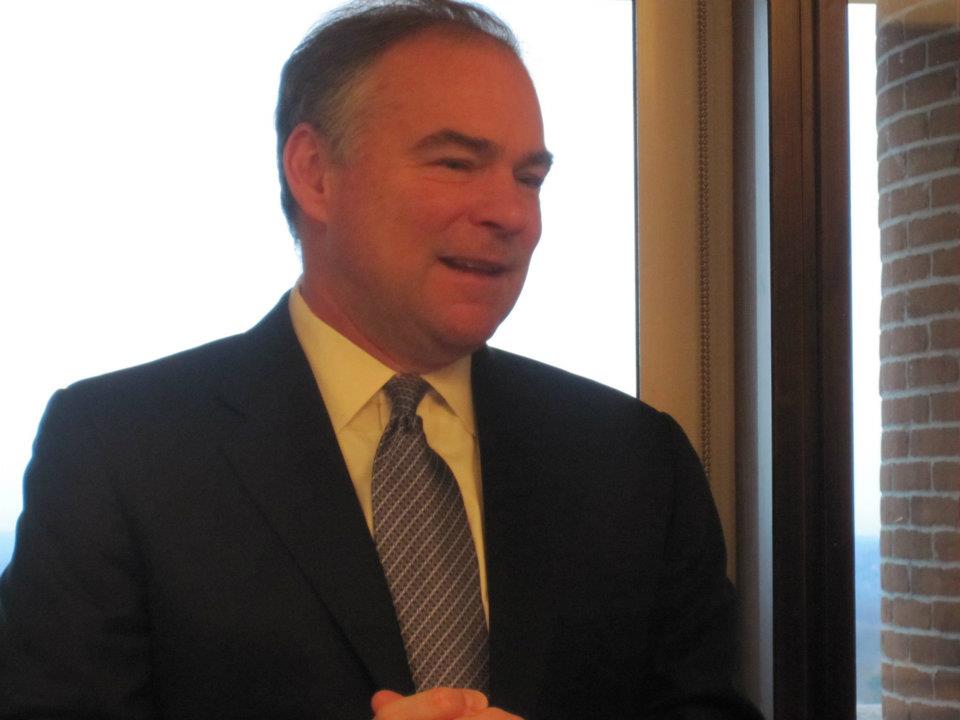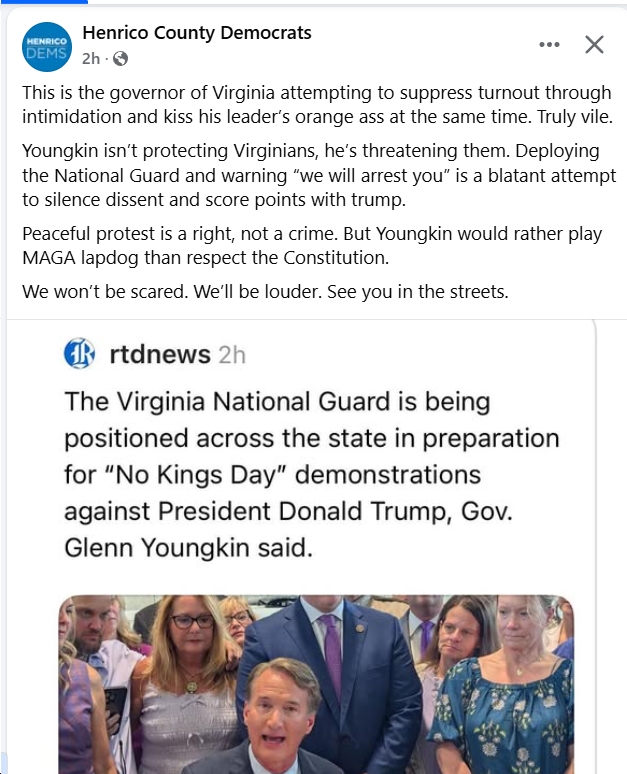 Former Governor Tim Kaine, now Candidate Kaine for Senate, spoke this morning at the January breakfast of the Northern Virginia Democratic Business Council (held at the Tower Club in Tysons Corner). Kaine called this the beginning of “the Sprint” to election day in November, providing the friendly audience with a sample of what will be the main themes of his campaign. With typically sunny Kaine optimism and gentility, certain key words emerged: “balance,” “working together” to solve the country’s problems, and focusing on encouraging “education and talent.” These concepts emerged as guiding principles when tackling one topic after another, from deficit reduction to immigration to education. Democrats, he noted, are the party of business and of opportunity for all.
Former Governor Tim Kaine, now Candidate Kaine for Senate, spoke this morning at the January breakfast of the Northern Virginia Democratic Business Council (held at the Tower Club in Tysons Corner). Kaine called this the beginning of “the Sprint” to election day in November, providing the friendly audience with a sample of what will be the main themes of his campaign. With typically sunny Kaine optimism and gentility, certain key words emerged: “balance,” “working together” to solve the country’s problems, and focusing on encouraging “education and talent.” These concepts emerged as guiding principles when tackling one topic after another, from deficit reduction to immigration to education. Democrats, he noted, are the party of business and of opportunity for all.
Kaine reminded the audience that in the 1950’s, Virginia was 49th among the 50 states in percentage of children in school, yet today we rank 7th, thanks to finally following Thomas Jefferson’s original notion of broad public education, and to building a powerful, balanced economy that attracts successful businesses and outside talent. “No state has moved as far as Virginia,” according to Kaine, and in his view, Virginia can show America how to move forward.
In dealing as Governor with the state budget during a severe recession, Kaine pointed out that he never applied across-the-board cuts, but used surgical precision in selecting not only where and how to cut, but sometimes actually increasing funding to reflect priorities, focusing on encouraging talent and creating and favoring business development. Kaine will apply the same ability to make hard but principled decisions at the national level because, he noted wryly, “No one has ever cut their way to prosperity.” By encouraging immigration of talented people, Kaine attracted new businesses to Virginia, even in the midst of a recession.
As he has crossed the Commonwealth, Kaine claimed that the main problem troubling voters everywhere, regardless of political affiliation, was not the deficit nor even the economy, but a demand that elected officials at every level must work together. In other words, the public regards the current dysfunction of government as being due not to a broken system, but to demagoguery and an unwillingness to work together (across the aisle) in simply governing. Using his term as Governor, when he worked with a Republican Assembly, he said he had plenty of experience in getting things done by working with political opponents. The key, in his words, is “not to let disagreement on one issue poison the relationship,” just move on to the next topic and see where you can create a meeting of minds.
To the surprise and pleasure of former military in the audience, Kaine emphasized his commitment to helping veterans re-integrate with civilian society, finding them jobs when they come home. For the first time, he mentioned his likely Republican opponent, George Allen, by name, mentioning that Allen’s answer for the economy and job creation was the stale formula of “cut taxes, cut regulations, and drill but we have already tried that policy, and it brought us the Great Recession—- obviously, Kaine implied, we need more practical answers, which he has.
After Education/talent and helping veterans, Kaine listed the Budget Deficit as his final major priority , once more emphasizing “Balance.” Here he acknowledged that Social Security was not in trouble, but bluntly said, Yes, some other entitlements might have to be cut, but at the same time the Bush tax cuts must also be allowed to expire for the wealthier part of society which would therefore mean there would be pain at both the top and the lower income levels. You cannot achieve balance via im-balance, a concept he feels Virginians grasp and approve. This naturally raised the question of bipartisanship in Congress, something he says will have to start naturally in the Senate, a more collegial body, than in the politicized House, where, in fact, we have already seen the Senate passing the jobs bill with 95 ayes, thus forcing the House to, well, behave itself and also pass the legislation.
Among questions raised by the audience was one about the effect on Virginia of upcoming Defense cuts Kaine pivoted to technology as a partial answer, raising the idea that despite the necessary cuts, we might want to consider actually putting more money into cyber resources in the future. No Child Left Behind came up, and Kaine’s approach was to change the emphasis from developing minimum standards of competence to setting goals and outcomes to encourage excellence. He also wants to develop more technical education and broaden pre-school education for children if we want to keep America competitive. Moreover, the policy of forcing the for-profit colleges to prove their success rate should also be applied to regular institutions of higher education, in his opinion. As he said, while education is supposedly a matter of state control, not federal, the truth is, other countries have national policies, and we are falling behind without national goals of our own.
The Occupy Wall Street movement came up in the context of getting those participants to vote, and vote Democratic; as Kaine noted, the Occup6y movement has specifically refused to be co-opted; interestingly, he regards the movement primarily as a critique of policy makers. The Occupy movement senses that the system is rigged against them as a result of policy decisions made by elected officials, and, in fact, most members of the Tea Party actually agree. The concept of the 99 percent has entered political discourse, and, in Kaine’s view, this entire idea will be even more important if Romney, the quintessential financial economy businessman, becomes the Republican nominee for President. One member of the audience archly inquired if we had verifiable statistics on the number of jobs lost from Romney’s work at Bain Company, acquiring and gutting other companies; Kaine remarked it was a good question, but he had no figures firm enough to go public with them.
To the audience’s pleasure, Kaine added that he had no intention of “distancing” himself from President Obama. He felt the man was doing a good job, he liked and admired him. He believes he is going to win, is very positive and says there has been too much doom and gloom. Unlike some peddlers of doom, Kaine does not believe America is in decline. Our best years are ahead of us, and he will campaign on that note.














